Witness to the Resurrection in Celebration of the Life and Legacy of C Payne Lucas
COMMENTS AT C PAYNE LUCAS’s
“Witness to the Resurrection in Celebration of the Life and Legacy of C Payne Lucas”
AFRICARE created an opportunity for the first time for African Americans across the USA to contribute to Africa In a substantive way.
C. Payne would not accept a raise. The board had to convince him after many years that he had to accept a raise because his salary was keeping the staff’s salaries too low.
Africare was first located in the basement of the Niger Embassy.
He then found a building that needed a lot of repairs in an undesirable (at the time) location in DC, With his legendary persuasive and visionary skills, C Payne bought it for a low price with many donations.
No one could say “no” to C. Payne. He could persuade anyone to do anything – anywhere all of the time. He was a combination of a preacher and a car salesman.
He made everyone feel good and brought laughter wherever he was.
One time he visited an African leader who was in a retreat due to challenges in the country. The man was depressed. After C Payne visited him, and within a few hours, Payne had the leader laughing.
One of his staff recalled that C. Payne could sleep no matter where he was or whatever the circumstances. One time they were sleeping in a small dilapidated building in a village. The staff member woke up to a sound at the door. He opened the door and there was a rhinoceros!
When he told C Payne, it didn’t affect him at all. Payne immediately went back to sleep.
He could also sleep while in any rickety jeep or carriage, in severe heat and dust, while traveling over potholes from one African village to the next.
His children and grandchildren loved him because C. Payne played Santa Clause every Christmas. Everyone was invited to the Lucas home. And everyone participated– singing, reading, acting,…..
If someone came without an invitation, it didn’t matter. Everyone went home with a present.
C Payne Lucas’s humanity and caring always shone through.
As Sargent Shriver said, “The cure is care.” Those words certainly rubbed off on C. Payne.
Photos by Geri Critchley (Senegal 1971-72)
C. Payne with Mlapa chief of Togoville, November 1962
In June, 1961, C. Payne received an M.A. in government from American University with a thesis on “The Foreign Affairs Functions of the House Committee on Government Operations.” A research internship with the Democratic National Committee aroused his interest in the Peace Corps “as an instrument of foreign aid in areas where AID had been unsuccessful.” In May, 1962, he joined the Africa Regional Office as operations officer for Ghana and Sierra Leone. “It was lucky that I started concentrating on French,” as he put it, because six months later he was in Togo as the Country Director.
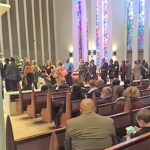
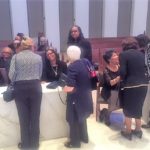
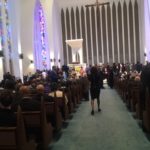
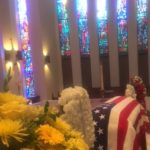
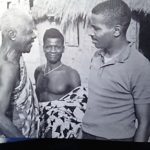
I first encountered C. Payne as a Peace Corps trainee, headed for Dahomey, in Philadelphia during staging in February of 1969; he gave a talk which I’ll never forget; at the time he was Regional Director for Africa. About four years later he hired myself and Peter Persell as the first two permanent overseas Africare representatives; I worked for Africare in a number of countries, my last post being in Liberia. It was there I saw C. Payne for the last time; he had come on a special State Department TDY and I and the Africare Liberia staff welcomed him at the airport in Monrovia.
I was at his funeral and it was obvious how many lives he had touched, both directly and indirectly. He was one of a kind; we shall probably never see a man like him again.
With best regards,
Denis J. Hynes
PCV Dahomey (1969-1971)